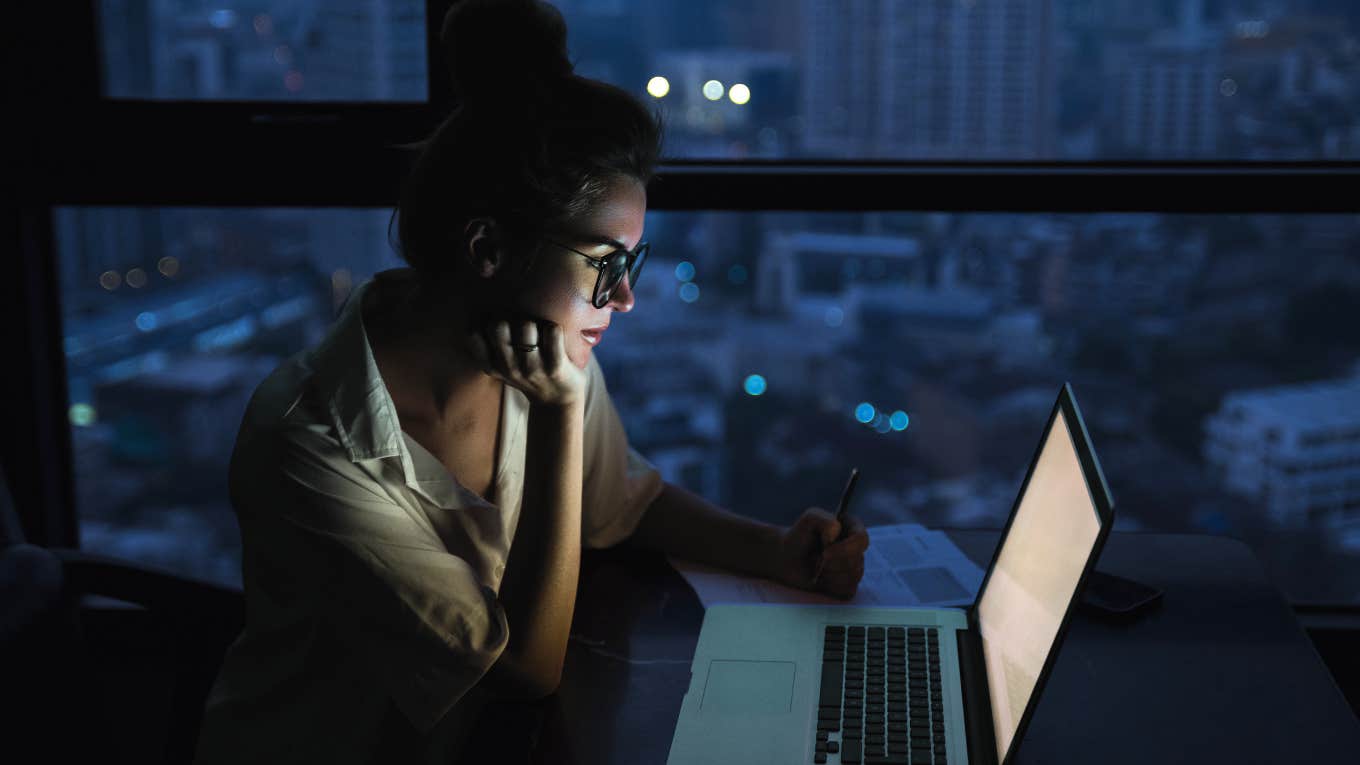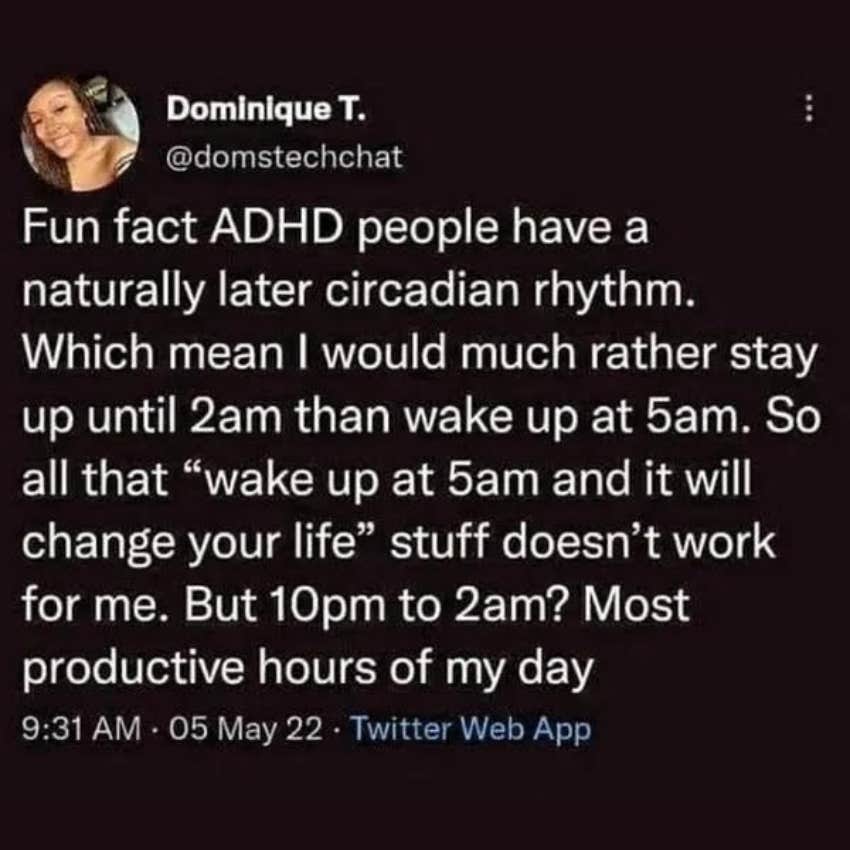My ADHD Makes Me Semi-Nocturnal
A little-known symptom of ADHD, why it happens, and how I cope with it.
 Jun | Canva
Jun | Canva I get my best work done after 10 p.m. Whenever I have a big project, I do it at night or in the early morning when everyone else is probably sleeping. I feel more focused and energized at night than I do all day, and my work output reflects that.
Last spring, I worked on a 1000-page-plus consulting project overnight, starting around 8 p.m. and working until 5 a.m. (taking small, frequent breaks to watch Murder She Wrote and whatever other re-runs were playing while I worked) every night. I did that for several weeks. I always thought there was something wrong with me, but after doing some research, I realized I'm not alone — many folks with ADHD have the same preference. And there are a few legitimate reasons why.
I jokingly describe myself as "semi-nocturnal," and I've had this tendency for as long as I can remember.
As a child, I stayed up late, sometimes until midnight, watching shows like I Love Lucy or reading books. Unfortunately, this would mean I was so tired the next day that I would find it impossible to wake up and get going without caffeine.
I was practically comatose through most of my classes until lunch, when I had a brief spurt of energy before being hit by that afternoon slump. All through my teens and twenties, I was much the same way — I would rather stay up until 3 a.m. (or later) and sleep in until noon than go to sleep early and wake up at a 'reasonable time.' I thought this would shift as I hit my thirties, or I could change it with willpower, but I'm still finding the evening and late evening hours more conducive to focused work than during the day.
Sometimes I feel guilty that I can work whenever and however I want.
I’m fortunate that my mom is also a night owl (I often wonder if she has ADHD, too….), and we both stay up co-working when everyone else has gone to bed. I feel guilty because 1) I realize I’m privileged to be able to hold such irregular hours, and 2) I feel like I’m "adulting" wrong.
Leaders like Benjamin Franklin famously said, “Early to bed and early to rise, makes a man healthy, wealthy, and wise.” What would he say if he saw me writing in the early morning hours, still guzzling my assorted beverages, including caffeinated tea, while the TV blares Dateline re-runs? After all, getting up early is still considered a virtue in our culture. Productivity culture echoes the attitude of our Puritan ancestors, who believed hard work and discipline were more important than the comfort of sleep.
Every productivity guru will tell you that the best way to get more work done is to sleep early, wake up before everyone else, and, most likely, carry out a complicated morning routine to cement your superiority. But how could I sleep just when I started to feel alive? Instead, I reverse it and stay up when everyone else sleeps. It's the same general principle as waking up early, anyway — I'm getting work done before (or after) my responsibilities begin for the day.
Staying up late seems to be a common ADHD symptom
As with most of my quirks, I thought I was alone in my semi-nocturnal habits until I started researching and reading about other experiences. Additude Mag‘s article, "Night Owls with ADHD: How Staying Up Late Boosts Productivity," was particularly vindicating. Hayley, one of the adults quoted in the story, echoed my feelings writing, “I am much more creative and productive at night. It’s like a light switch flips on and, after a day of fog, I can finally think clearly.”
All quoted said they felt more productive at night, appreciating the lack of distractions and quiet, and some even noted that their creativity significantly increased in the late night/early morning hours. I most appreciated Emery’s description of nighttime work as "bonus hours" because even though I have all day to do things, I often feel unable to work due to other distractions, procrastination, or disinterest. At night, though, I feel empowered to finally spend more time writing or organizing myself for the next day.
We focus better at night
I used to think I stayed up because I was undisciplined and was engaging in some revenge bedtime procrastination. Lately, however, I realized that most of my nocturnal tasks have been work-related. I write a lot, draft work documents, and get stuff done.
Sometimes, I watch TV to relax and spend quality time with my mom, but more often than not, I get drawn into writing an article or working on my Substack, and the hours fly. It's easy to imagine that others like me start working on something "just for a while” after dinner; before they know it, it's 4 a.m.
That's focus and time blindness at its finest. This happens most often when I'm writing or focused on something I'd procrastinated on that has to be done by the next day. Blind panic has always been a good motivator.
We feel more creative at night
Pablo Picasso famously worked until 4 or 5 a.m., and several other well-known artists also embraced nocturnal creativity. There might be a reason for that. Brant Hasler, assistant professor of psychiatry at the University of Pittsburgh School of Medicine, states in this article about late-night creativity there is a legitimate reason we have more creative thoughts in the middle of the night.
"Hasler tells me that the prefrontal cortex, the part of the brain associated with the ability to concentrate, begins to falter as sleep drive increases at the end of the day. For some, this clears the way for more flexible thinking — and potentially, creativity. 'With less of that top-down control and ‘cognitive inhibition,’ the brain might be freed up for more divergent thinking, allowing one to make new associations between different concepts more easily.' Hasler says that this effect combines with what research suggests is a peak in positive mood during the second half of the day, which can also be a catalyst for inventive thoughts.
You may also stay up late because it’s the only time you can work. Logistically speaking, if you have kids or are a caregiver for other family members, doing your work is easier when they are in bed. Even if you don't have any familial responsibilities, those of us with ADHD often find it easier to work at night because there are fewer distractions. I love working at night because, as I tell my friends, “no one is awake to bother me.” No one will email, text, call, or otherwise interrupt my workflow.
Delayed circadian rhythm
 Screenshot from author
Screenshot from author
Those of us with ADHD often have Delayed Sleep Phase Syndrome, in which our circadian rhythms are delayed several hours past neurotypical people's. Unfortunately, this can also lead to sleep debt and difficulty waking up the next day.
I'm lucky that I can sleep in when I stay up late — most folks with 9–5 jobs and other responsibilities cannot do that and often have to cope with sleep deprivation. When I do sleep, it varies widely — some days, I get 6 hours and feel fine; others, I ignore the snooze and sleep up to 10. Both make me feel good, regardless of what time I go to sleep. It’s the hours that matter, not the timing.
Not everyone believes in my nocturnal lifestyle, though, especially doctors. Years ago, when I told a doctor about my semi-nocturnal habits and the energy I felt after 8 p.m., she expressed concern that I had hormonal imbalances that might be causing it. "Feeling more energetic at night isn't normal," she said and advised getting more tests. Unfortunately, I could not follow up shortly after because she stopped accepting my insurance. So, I never found out if hormones played into it. But now, knowing what I do about ADHD and Delayed Sleep Phase Syndrome, I think that might have been the actual cause.
Caffeine and staying awake
Last night, I stayed up all night. I went out to the Lake to capture the sunrise since I’m so rarely awake to see it. As I drifted to sleep, I could hear the birds tweeting outside my window and see the lightening sky behind the curtains. It was surreal since I'm rarely awake in the early morning — the only time I experienced it was if I had stayed up all night.
I realized today that I was awake because I made fresh tea around 8 p.m. and drank it until 1 a.m. Although it’s not black tea, it has enough caffeine to stimulate. For me, caffeine is one of the tools I use to manage my ADHD. In appropriate doses, it helps me get stuff done. I can’t imagine my life without it. Although it's not recommended as a "treatment" for ADHD, there is some evidence that it can improve focus and alertness because it increases dopamine levels, which are lower than average in ADHD brains.
Of course, a downside is that it can make it difficult to fall asleep and delay your body clock further. Suppose you already have a delayed circadian rhythm and add caffeine. In that case, you might get an artificial boost of energy that will keep you working past your natural tiredness point, which can cause insomnia or poor sleep quality. Experts recommend stopping the consumption of caffeine six to eight hours before bedtime, and for me, with my drinking stim, that’s difficult. I keep drinking my tea nearly right up until I go to sleep.
However, it's worth remembering that most of these studies are done on folks with neurotypical brains, so they may not accurately represent the ADHD experience. In Jessica McCabe's How to ADHD, which I’m currently listening to on Audible, I heard anecdotes from her listeners who noted that they do the exact opposite of what is recommended to make themselves sleepy — drinking caffeinated beverages, watching TV, looking at screens, etc.
So perhaps caffeine and the other pre-sleep no-nos aren’t as much of an impediment for ADHDers as it is for neurotypicals. They may help.
Should I embrace being a night owl?
As with many things, it depends on how you feel and how it impacts your life. If you cannot function the next day because you stayed up too late, that could cause problems. Sleep debt is real; too many instances of getting minimal sleep can harm your health in the long run, and everyone has different sleep needs.
However, if you can't fall asleep anyway, it might be better to use the time wisely than to spend it trying to will yourself to fall asleep (it doesn't work). My schedule is OK. I enjoy staying up late and getting a lot of work done, and I can usually sleep in the following day.
Do what works for you, and if you have ADHD, understand that your preference for evenings might be another way you're wired differently.
Christie Sausa is a writer, athlete, and performer. She has contributed to various local, regional, and national publications, been featured in global ad campaigns as a figure and speed skater, and appeared as a background actor in various television shows like The Deuce and The Gilded Age.
